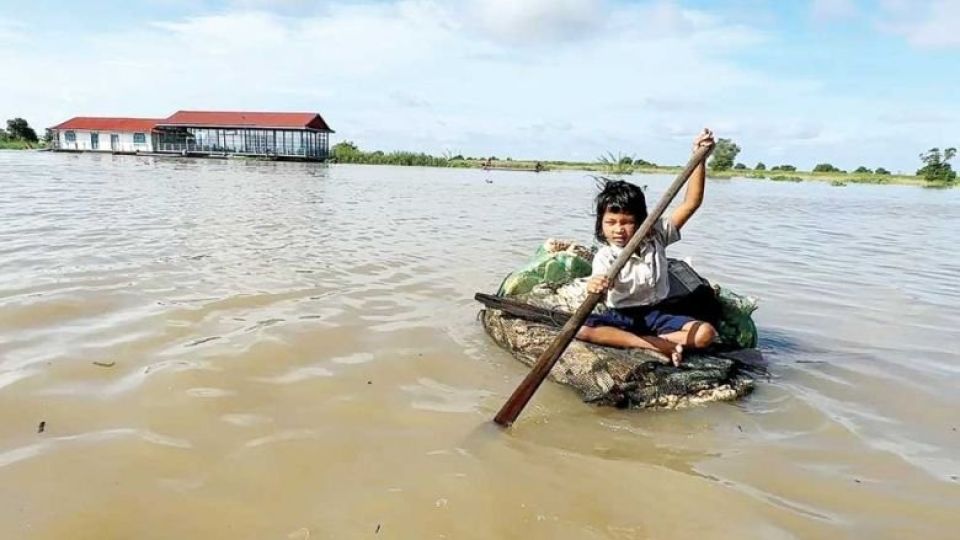September 8, 2023
PHNOM PENH – Although aware of the risks associated with using a foam raft, a young girl finds herself compelled to rely on this unconventional means of transportation to reach school each day.
Chhong Kunthea, a six-year-old girl, faces the unpredictable waters while riding on her makeshift vehicle, navigating waves that pull her in different directions. Her destination: the floating school, where she is eager to learn from her teachers.
Kunthea comes from a family of six siblings, with her being the fourth child of her 40-year-old father, Euy Kim, and her mother Phat Chantha. She currently attends the first grade at Mechrey Primary School, a floating institution located in Keo Poa commune’s Peam Ta Or Village, within Siem Reap Province’s Puok district.
Her family’s home is also a floating structure, and due to financial constraints, she must rely on a homemade raft to reach school.
Each journey to school is fraught with fear for Kunthea. She lacks confidence in her swimming abilities and worries about drowning in case of strong winds.
However, her thirst for knowledge propels her forward, motivating her to brave the waters. There are times when she even struggles to find a mode of transport, as hers requires frequent repairs, leading her to seek assistance from others with boats.
Happier days came for Kunthea after a man filming her during one of her regular trips to school in early August. He posted the video to the YouTube channel Rumduol TV, and since then, she has received generous donations from at least two philanthropists.
”I am so happy to have received two boats I can use to get to school. I no longer ride in the foam raft,” she said.
Her father, Kim, shared that he was initially hesitant to let Kunthea attend school because of safety concerns. Due to limited resources, the family owned only one vessel, which he used to collect snails every day.
As his daughter insisted on going to school, he collected enough materials to assemble the 1.5m craft. Its limitations only increased his worry but Kim’s love for his daughter and her unwavering determination eventually convinced him to support her education.
“Now Kunthea is happy. I give my thanks to the donors who have shown such compassion for her. She told me that she will struggle to learn, even though we live on the water,” he said.
Chhuon Sovanna, the principal of Mechrey Primary School, provided an insight into the educational institution. With 248 students, the school serves Grades 1 through 6, as well as two kindergarten classes.
Despite all students relying on boats to reach the school, no drowning incidents have occurred. The school emphasises safety and caution to both students and parents, ensuring that everyone remains vigilant during their waterborne journeys.
The school receives support from various sources, including OneChild, a non-profit group, and a collaboration between the Ministry of Education, Youth and Sport and the Siem Reap Provincial Department of Education. They provide rice to 41 underprivileged students and allocate funding to 20 other students annually.
The students also receive meals and clean drinking water, in order to support their education journey.
Sok Loeur, chief of Peam Ta Or village, highlighted the unique lifestyle of the community, where 286 floating houses accommodate 400 fishing families. The residents, despite their unconventional living arrangements, have adapted well to life on water and do not encounter significant dangers.
Ly Bunna, director of the Siem Reap provincial education department, said that although parents typically train their children to swim, there’s an understanding that children without swimming skills should not be sent to school for safety reasons.
Collaborations with organisations like Kampuchea Action to Promote Education (KAPE) and OneChild help ensure the welfare of students in these areas.
Bunna said that Kunthea’s ability to swim makes her suitable for the journey. He noted that residents in water areas are accustomed to aquatic environments and generally forego flotation devices due to their swimming proficiency.
Projects aimed at aiding the poorest students include sponsoring boats for transportation to and from facilities.
Despite the challenges faced by students attending these schools, Kunthea’s story stands as a testament to determination and the transformative power of education.


